How Hybrid Healthcare Improves Sleep Hygiene in Aging Adults

Bridging Traditional and Modern Solutions for Better Sleep in Aging Populations
As the global population ages, ensuring quality sleep remains a priority due to its profound impact on overall health, cognitive function, and quality of life. Hybrid healthcare models—integrating behavioral therapies, technological innovations, and multidisciplinary strategies—offer promising avenues for improving sleep hygiene in older adults. This article explores how these integrated approaches enhance sleep quality, their scientific backing, and future implications for holistic aging care.
Understanding the Foundations of Hybrid Healthcare for Sleep Improvement
What is hybrid healthcare in the context of sleep health?
Hybrid healthcare combines various treatment approaches—behavioral, technological, and clinical—to create a comprehensive system for improving sleep, especially in older adults. It integrates traditional therapies like cognitive behavioral therapy for insomnia (CBT-I) with innovative digital tools and health services to enhance accessibility and personalization.
Through this model, patients have access to multiple layers of support, from face-to-face clinical care to remote monitoring and app-based interventions. This flexible approach aims to overcome barriers like limited access to specialists, making effective sleep treatment more widely available.
Components including behavioral, technological, and clinical approaches
Behavioral components often include sleep hygiene education, relaxation, mindfulness, stimulus control, and sleep restriction techniques. These strategies help modify maladaptive beliefs about sleep and address issues like nocturia or sleep discrepancy common in older adults.
Technological tools encompass internet-based and app-based CBTi, which expand access and provide real-time guidance. Platforms like COAST, a digital health app, include algorithms to detect sleep patterns, decision support for clinicians, and personalized intervention plans.
Clinical approaches involve trained healthcare professionals delivering or supporting these interventions. Abbreviated and stepped-care models, which can be managed by non-specialists or through technology, have demonstrated promising results, making care more scalable.
The importance of multidisciplinary collaboration
Success in hybrid healthcare relies on collaboration among sleep specialists, primary care providers, mental health professionals, and technology developers. Such teamwork allows for comprehensive assessment, tailored treatment plans, and ongoing support.
Training healthcare workers in geriatric sleep health and using simulation or virtual learning enhances the workforce's capacity to deliver quality care. Public health initiatives also play a vital role by creating supportive environments and addressing social determinants like social isolation.
Why hybrid healthcare models benefit seniors
Implementing hybrid models offers tailored interventions that address both sleep issues and related health conditions, such as chronic diseases or mental health disorders. This approach fosters better treatment adherence and engagement, which are crucial for positive outcomes.
In addition, integrating digital tools into routine care can help monitor sleep patterns remotely, alerting providers to problems and allowing timely intervention. Overall, hybrid healthcare creates a resilient, accessible, and personalized system aimed at fostering healthier aging and improved sleep quality.
The Role of Psychological Treatments in Enhancing Sleep
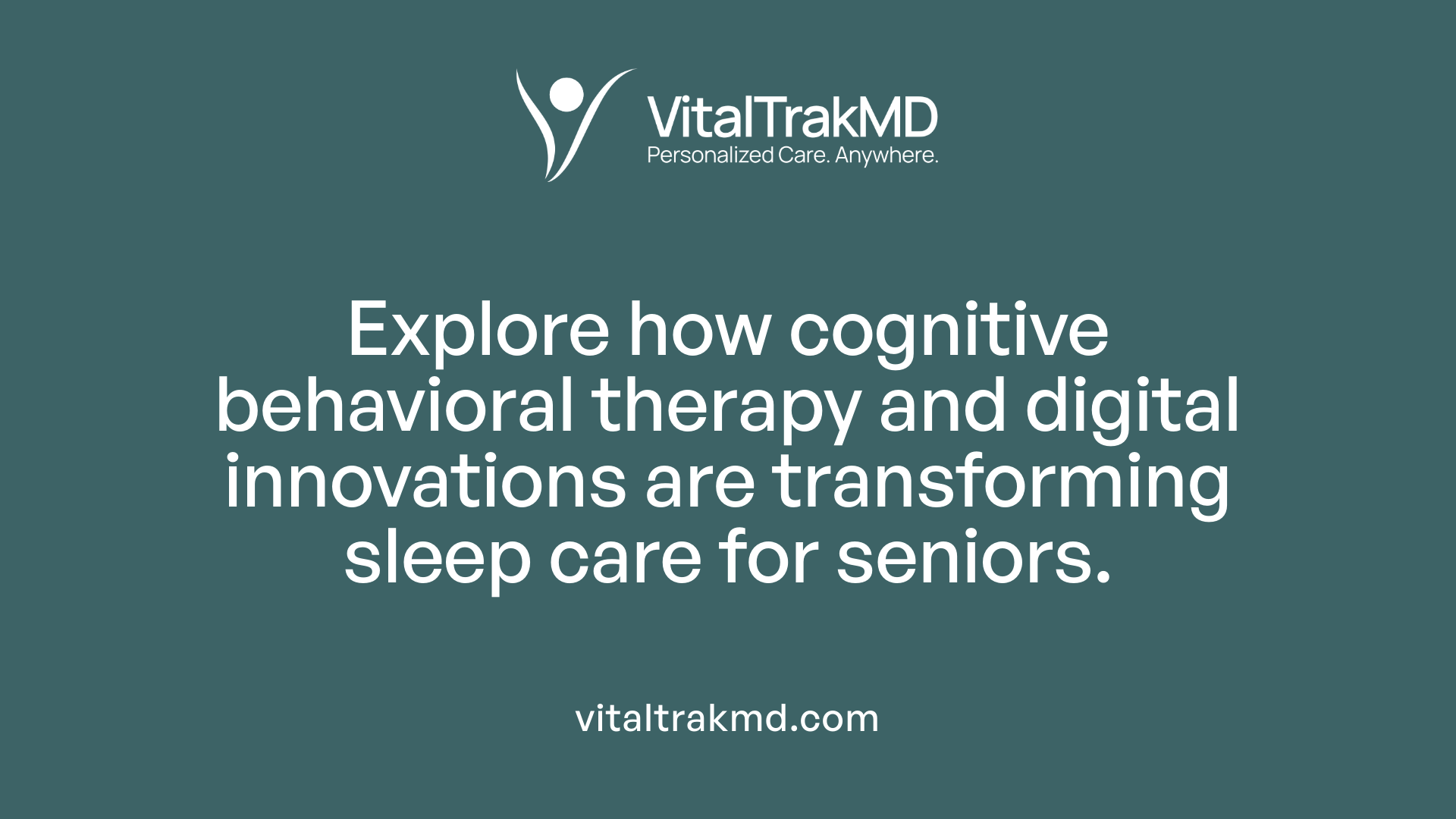
What is the primary psychological treatment recommended for late-life insomnia?
Cognitive Behavioral Therapy for Insomnia (CBTi) is considered the front-line treatment for older adults suffering from insomnia. It is supported by leading medical societies as an effective approach to improve sleep disturbances.
Which behavioral strategies are used to improve sleep in older adults?
Various behavioral techniques have shown benefits, including sleep hygiene education, relaxation exercises, mindfulness practices, stimulus control, sleep restriction, and cognitive therapy. These strategies target maladaptive beliefs about sleep, reduce sleep-disrupting behaviors, and promote healthier sleep patterns.
How are newer technologies supporting psychological treatments?
To expand access and commitment, digital innovations like internet-based and app-based CBTi are being explored. These platforms facilitate self-guided or semi-supervised interventions, reducing barriers related to transportation, availability of specialists, and scheduling.
Are abbreviated and scaled-down versions of CBTi effective?
Yes, simplified and stepped-care versions of CBTi delivered by non-specialists or through digital means have demonstrated promising results. They offer feasible alternatives that maintain effectiveness while increasing the reach of sleep therapy among older adults.
Can psychological interventions help with sleep problems linked to other health issues?
Absolutely. Even with comorbid chronic health conditions and mental health disorders, psychological treatments such as CBTi remain effective. They can also address specific issues like sleep discrepancy and nocturia—common complaints in senior populations—by educating patients and challenging unhelpful beliefs.
What emerging techniques are gaining attention?
Research supports the benefits of mindfulness and relaxation techniques in improving sleep quality. These approaches are increasingly integrated into broader sleep treatment protocols for seniors.
How is technology being used in clinical trials?
A recent study involves a hybrid implementation-effectiveness trial of the COAST platform, a digital health tool designed to support behavioral sleep interventions. It includes a clinician portal and a patient app, leveraging algorithms for pattern detection, decision support, and tailored interventions.
What are the goals of these trials?
The trial aims to evaluate different deployment strategies—such as no facilitation, external facilitation, and internal facilitation—in military healthcare settings. These efforts intend to enhance the accessibility, uptake, and sustainability of digital sleep solutions.
Why are digital solutions important?
Digital technologies like COAST offer scalable, resource-efficient, and potentially cost-effective methods to deliver evidence-based sleep treatments. They can overcome barriers to traditional therapy and improve health outcomes among aging populations.
What outcomes are being measured?
The efficacy of these interventions is being assessed through improvements in insomnia severity, measured by tools like the Insomnia Severity Index (ISI), alongside other sleep and mental health indicators.
How do these approaches support aging in place?
By utilizing telehealth, remote monitoring, and virtual communication, healthcare providers can promote better sleep hygiene, detect sleep issues early, and support aging-in-place initiatives. These strategies are especially valuable within military and veteran populations.
What role does workforce training play?
Creating a workforce trained in geriatric principles—including simulation training and virtual learning—is essential. Proper education ensures that health providers can effectively deliver behavioral sleep interventions tailored to older adults.
What broader public health measures support sleep health?
Addressing social determinants like social isolation is crucial, as these factors negatively influence sleep quality. Public health programs that foster social engagement and supportive environments indirectly promote healthier sleep in older populations.
How can technology aid long-term care?
Expansion of telehealth, remote monitoring, and virtual communications enables continuous support for sleep hygiene, early identification of sleep problems, and personalized care—all vital for improving quality of life.
What other interventions show promise?
The Healthy Patterns Sleep Program, a nonpharmacological intervention developed by the University of Pennsylvania, involves timed activities such as reminiscence, exercise, and sensory engagement. Over four weeks, participants with memory issues experienced improvements in sleep quality and overall well-being.
Does activity timing influence sleep?
Yes, the study suggests that scheduling activities may significantly impact sleep disturbances. Properly timed daily routines can enhance sleep outcomes, especially in seniors with cognitive impairments.
How credible is this research?
Funding from reputable institutions like the NIH lends credibility and rigor to these findings, supporting the implementation of behavioral strategies in geriatric sleep health.
Technological Innovations in Sleep Treatment
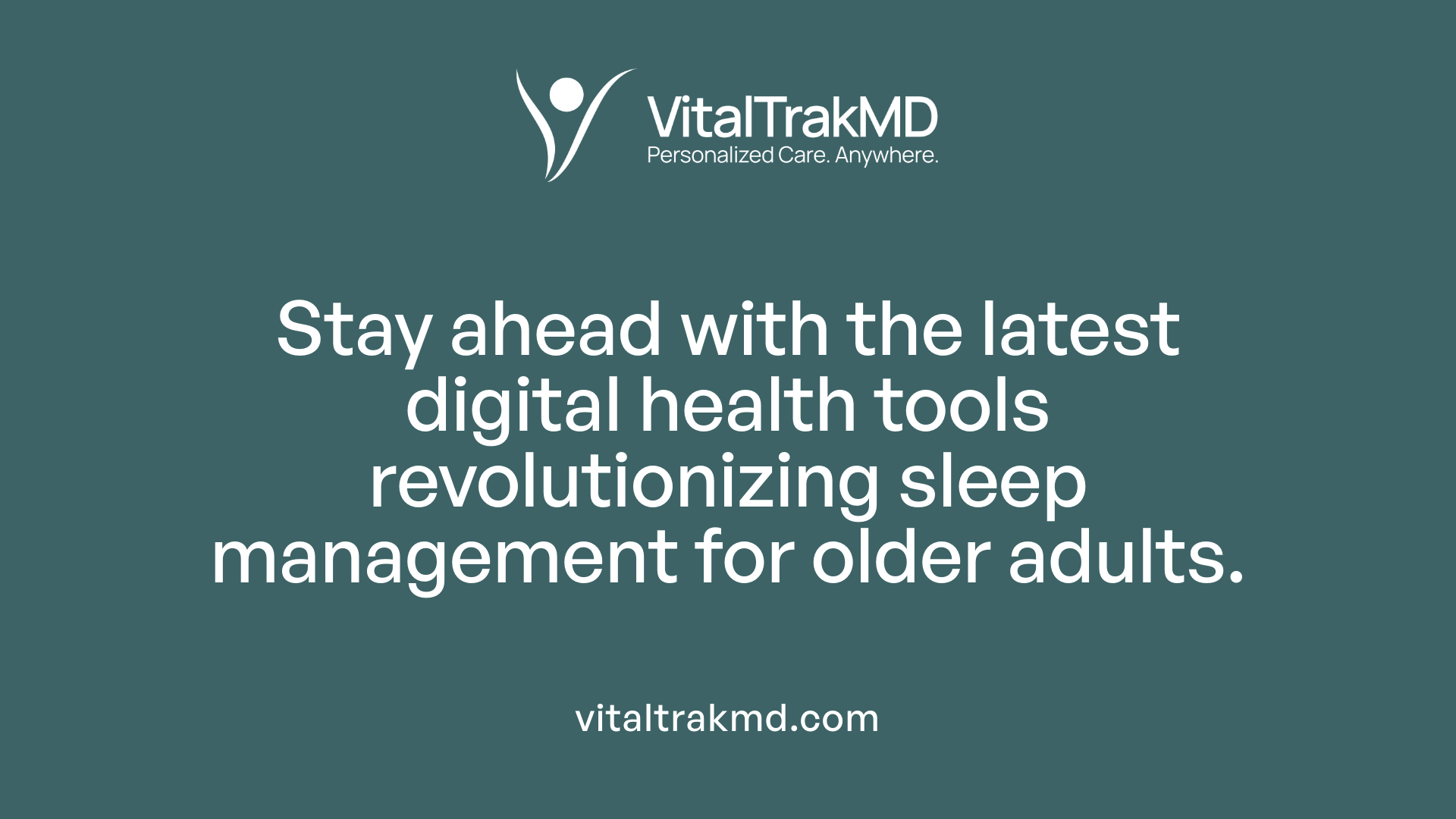 Recent advances in digital health technologies have revolutionized the delivery of sleep interventions for older adults, making treatments more accessible, personalized, and resource-efficient.
Recent advances in digital health technologies have revolutionized the delivery of sleep interventions for older adults, making treatments more accessible, personalized, and resource-efficient.
One prominent example is the COAST platform, a digital health tool designed specifically to support behavioral sleep therapy. This platform features both a clinician portal and a patient app that work together to provide tailored interventions. The system uses sophisticated algorithms to detect patterns in sleep-disordered behaviors, enabling early identification of issues such as insomnia or sleep fragmentation.
The platform's decision support tools help clinicians select appropriate treatment strategies based on individual patient data, promoting a personalized approach to care. This is particularly useful in complex cases where older adults may have comorbid conditions, or where traditional face-to-face therapy is impractical.
To evaluate the effectiveness and feasibility of these digital solutions, researchers have implemented hybrid type 3 randomized trials. These studies not only measure health outcomes like improvements in the Insomnia Severity Index (ISI) but also assess how well the platform is adopted and sustained in real-world clinical settings.
Implementation strategies are a vital component of these studies. Different support models—such as no facilitation, external facilitation by experts, and internal facilitation within healthcare teams—are being tested to determine which approaches best enhance the adoption and long-term use of digital sleep interventions.
Preliminary results from these trials are promising. They suggest that technology-based interventions can significantly reduce sleep disturbances among older adults, even those with chronic and mental health conditions. Overall, integrating digital platforms like COAST into healthcare frameworks offers a scalable and flexible way to improve sleep hygiene and outcomes.
Summary Table of Sleep Treatment Innovations
| Technology/Strategy | Description | Benefits | Implementation Support |
|---|---|---|---|
| COAST digital platform | AI-powered detection of sleep patterns, personalized interventions | Increased access, tailored care | No facilitation, external, or internal facilitation |
| Algorithms for sleep detection | Automated recognition of sleep issues via behavioral data | Real-time monitoring, early intervention | Training and support for clinicians |
| Hybrid randomized trials | Combining clinical and implementation research | Measuring effectiveness and feasibility | Comparing different strategies for adopting digital tools |
| Psychological and tech integration | Combining CBTi and digital aids | Enhanced engagement and outcomes | Training, technical support, ongoing evaluation |
In summary, innovations like COAST exemplify how technology, psychological treatments, and multidisciplinary strategies are working together to create a more effective, accessible, and personalized hybrid healthcare model for improving sleep among older adults. The ongoing research aims to refine these approaches and expand their reach in diverse healthcare settings.
Nonpharmacological Strategies and Lifestyle Modifications
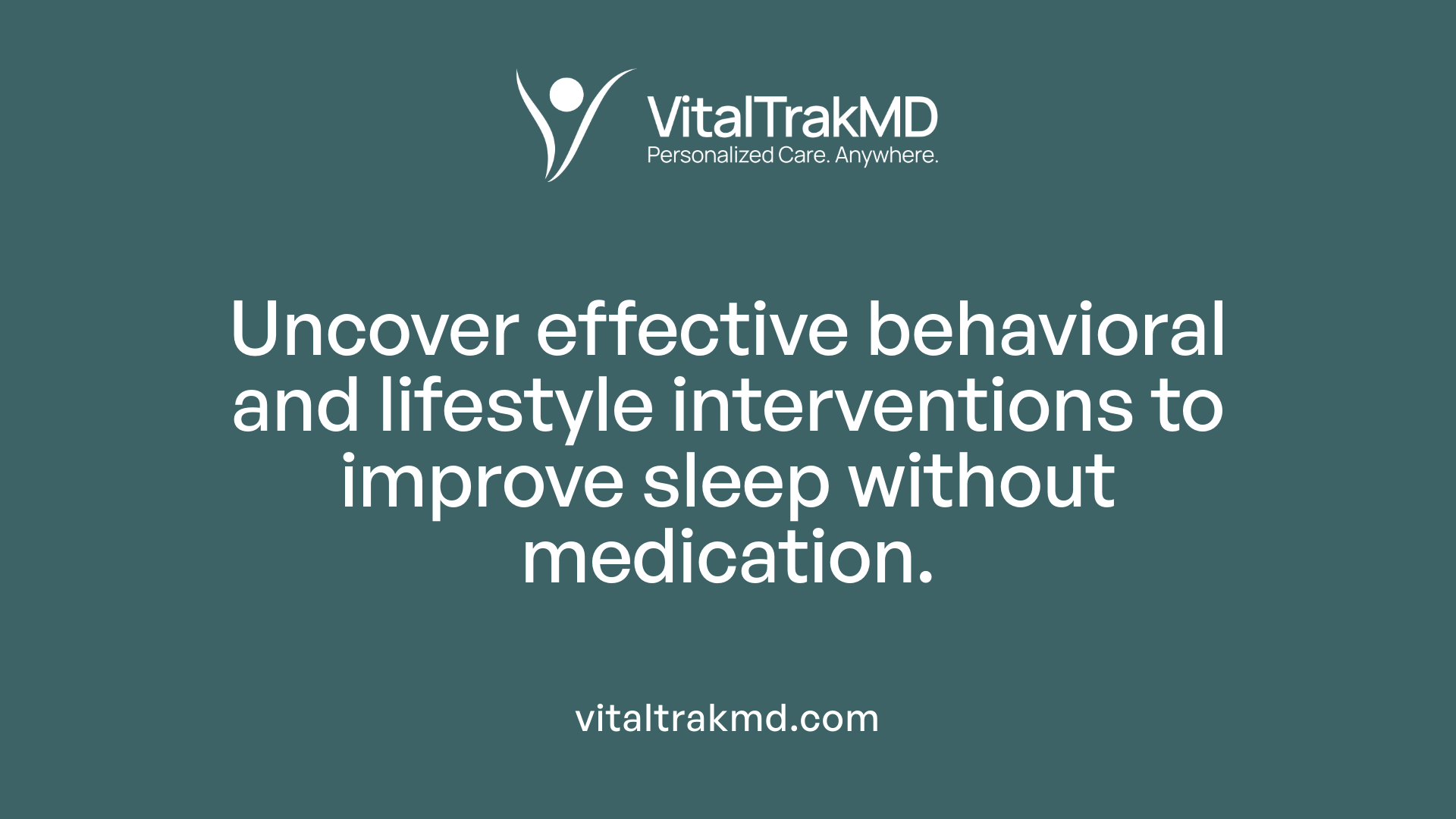
What innovative, nonpharmacological, and behavioral interventions are part of hybrid healthcare to improve sleep hygiene in aging adults?
In hybrid healthcare models, diverse non-drug approaches are employed to help older adults achieve better sleep. One primary intervention is cognitive-behavioral therapy for insomnia (CBT-I), which effectively reduces sleep latency and nighttime awakenings. To increase access, digital delivery methods, such as online platforms and mobile apps, are increasingly used, allowing older adults to engage with therapy from home.
Exercise also plays a vital role. Programs like Tai Chi, a gentle form of martial arts, have shown to improve sleep quality by enhancing physical activity and reducing stress. Additionally, environmental modifications such as improved lighting and noise control help create a sleep-conducive environment. Light therapy, which involves exposure to bright light during the day, supports circadian rhythm alignment, especially when natural light exposure is limited.
Mindfulness, relaxation, and sensory activities have gained attention as passive yet effective techniques. Practices like meditation, deep breathing, and gentle sensory stimulation can calm the nervous system and promote better sleep. Music therapy, involving calming and soothing sounds, alongside manual therapies such as massage or acupuncture, serve as supportive strategies to improve sleep quality.
Integrating these interventions into personalized, multidisciplinary care plans within hybrid healthcare systems offers an exciting and promising approach. This combination of behavioral, environmental, and mind-body strategies enables tailored support to manage sleep disturbances effectively in the aging population, especially when delivered through innovative digital platforms.
Expanding Access Through Telehealth and Remote Monitoring
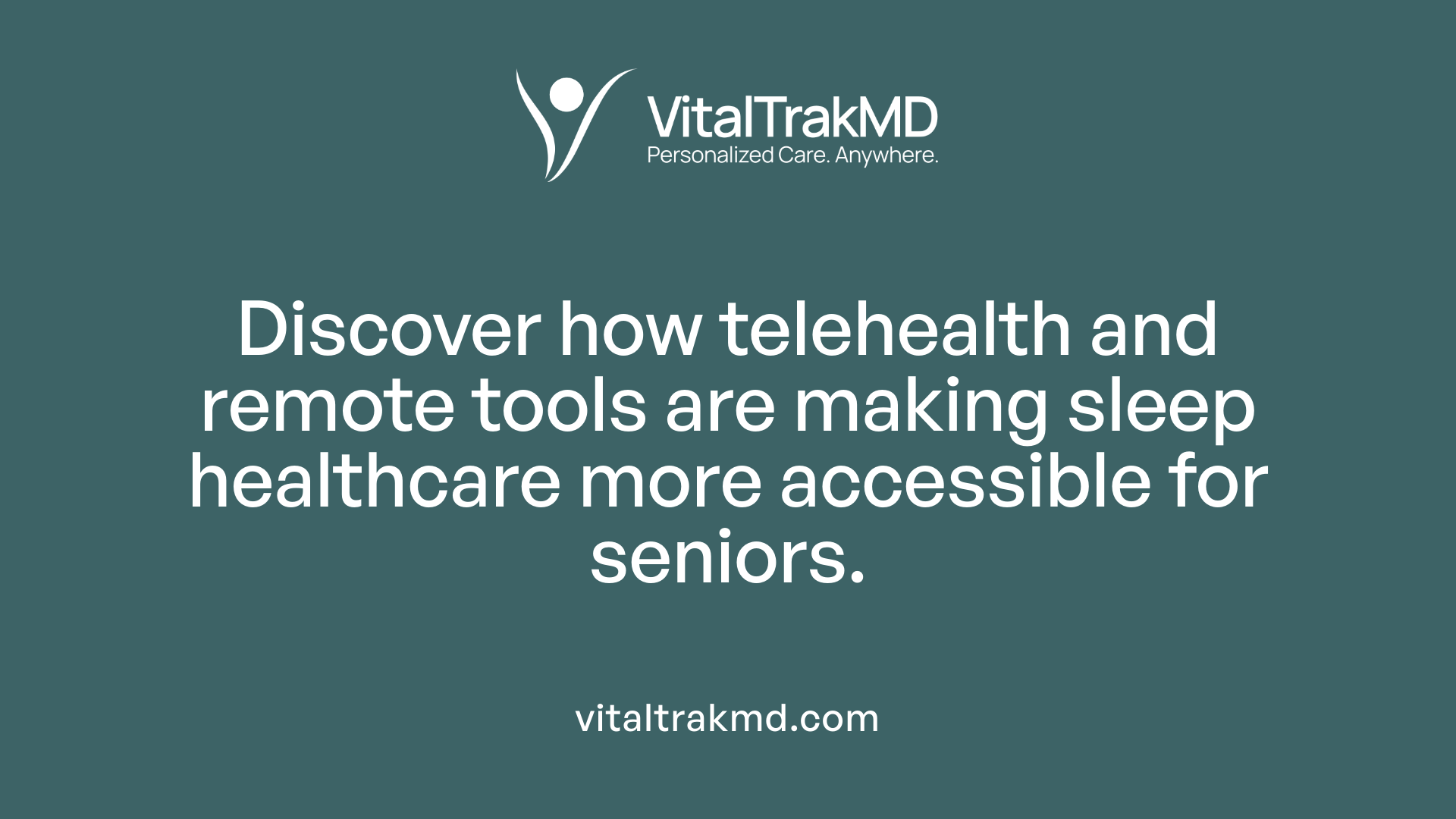
How do technology, psychological treatments, and multidisciplinary approaches contribute to hybrid healthcare for better sleep in seniors?
The integration of advanced technology, psychological therapies, and collaborative healthcare strategies is transforming sleep management for older adults. Telehealth services are increasingly used to deliver sleep therapies remotely, removing barriers related to mobility or geographic location. These services allow healthcare providers to monitor sleep patterns via remote monitoring devices that detect sleep-disordered behaviors without invasive procedures.
Devices like sleep trackers use sensors to record data on sleep duration, quality, and disturbances, helping clinicians tailor interventions more effectively. Alongside, digital tools such as AI-powered algorithms assist in detecting sleep issues and providing decision support for personalized care plans, making treatment more responsive and scalable.
Psychological interventions, notably cognitive behavioral therapy for insomnia (CBT-I), are effectively delivered through mobile health (mHealth) platforms and apps. These digital formats make evidence-based strategies accessible to a wider population, particularly crucial for aging adults who may face limited access to traditional clinics. CBT-I focuses on modifying unhelpful beliefs and behaviors related to sleep, addressing common issues like sleep discrepancy and nocturia.
Multidisciplinary approaches combine assessments from different healthcare providers—including sleep specialists, psychologists, and primary care doctors—using telehealth to coordinate care efficiently. This team-based model ensures comprehensive management of sleep disorders, integrating behavioral strategies, medication management, and education.
Research indicates that these combined methods improve subjective sleep quality and certain sleep parameters, though outcomes vary based on individual health status and adherence. Overall, the synergy of technology, psychological treatment, and team collaboration forms a robust hybrid healthcare model. It enhances access, personalization, and effectiveness in managing sleep issues among older adults, thereby supporting healthier aging.
Implementing such integrated care strategies offers a promising avenue for addressing the complex factors affecting sleep in seniors, especially within expanding telehealth frameworks and remote monitoring systems.
Addressing Social and Environmental Determinants of Sleep
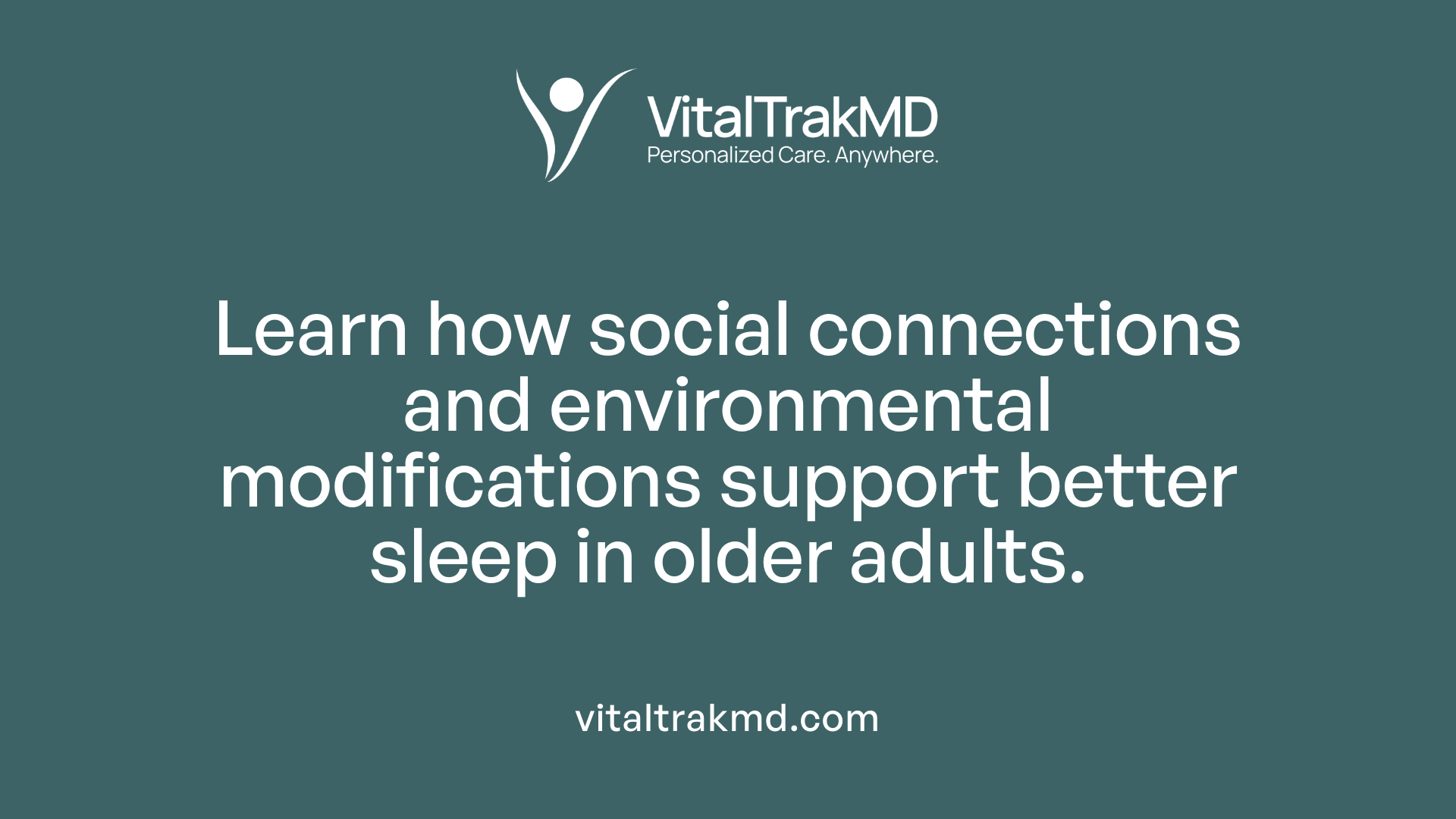
How can hybrid healthcare approaches improve sleep hygiene in aging adults?
Hybrid healthcare models are emerging as a promising strategy to enhance sleep hygiene among older adults. They combine traditional in-person care with innovative digital tools and community-based programs to address the multifaceted factors influencing sleep.
Social isolation and loneliness are significant contributors to poor sleep quality in the elderly. Programs that promote social engagement, such as community activities and social support groups, help foster a sense of belonging and reduce feelings of loneliness. These initiatives not only improve emotional well-being but also create a supportive environment that encourages regular sleep patterns.
Environmental factors play a crucial role in sleep health. Simple adjustments like controlling noise levels, optimizing lighting conditions, and creating sensory-friendly environments make homes more sleep-conducive. For example, using blackout curtains, noise machines, or adjustable lighting can significantly enhance sleep quality.
Aging in place is central to many older adults' preferences and can be supported through comprehensive strategies that combine social, environmental, and behavioral interventions. These include designing homes to be safe and accessible, integrating remote monitoring technologies, and encouraging activities that promote physical and mental health.
Technology-based solutions such as virtual communication tools and remote health monitoring enable continuous support and timely intervention. When coupled with community programs and personalized behavioral strategies like sleep hygiene education and relaxation techniques, these hybrid approaches can effectively improve sleep outcomes.
Overall, integrating social engagement, environmental adjustments, and technological advancements creates a holistic framework. This approach not only addresses sleep issues directly but also promotes a healthier, more connected, and independent lifestyle for older adults, supporting overall well-being and quality of life.
The Future of Hybrid Sleep Healthcare in Geriatrics
Innovations in digital health and personalization are transforming how sleep issues are managed in older adults. Technological advancements, such as AI-powered sleep tracking devices and digital health platforms, enable continuous, non-invasive monitoring of sleep patterns. These tools provide real-time data that supports personalized interventions tailored to individual needs, enhancing the effectiveness of treatment.
Psychological treatments, especially cognitive behavioral therapy for insomnia (CBT-I), remain the front-line approach. When delivered through mobile health (mHealth) platforms or online services, CBT-I becomes more accessible, flexible, and cost-effective. These digital options allow older adults to receive evidence-based care from home, helping overcome barriers related to mobility or limited specialist availability.
Multidisciplinary strategies are integral to this evolving landscape. They incorporate assessments, behavioral techniques, medication management, and technological tools to offer comprehensive care. By combining these elements, healthcare providers can address the complex factors contributing to sleep disturbances, including chronic health conditions, mental health issues, and social determinants of health.
Studies suggest that integrating technology with psychological and multidisciplinary care improves subjective sleep quality and objective sleep measures in older adults. For example, tools like the COAST digital platform, which includes clinician portals and patient apps with decision support algorithms, aim to expand reach and sustainability of sleep interventions in various healthcare settings.
Looking ahead, the future of hybrid sleep healthcare in geriatrics hinges on innovations that personalize care, leverage technology for scalability, and foster collaboration among healthcare teams. This approach promises to enhance sleep outcomes, support healthy aging, and improve overall quality of life for seniors.
Harnessing the Power of Integrated Care for Better Sleep in Aging Populations
As the landscape of healthcare evolves, hybrid models integrating behavioral, technological, and multidisciplinary strategies stand at the forefront of improving sleep hygiene among older adults. Scientific evidence underscores the effectiveness of tailored interventions like CBT-I, physical activity programs, and environmental modifications, delivered through innovative platforms and remote services. By fostering collaboration among healthcare providers, leveraging technology, and addressing social determinants, these approaches promise sustainable improvements in sleep quality, overall health, and quality of life for aging populations. The future of geriatric sleep health depends on continued innovation, expanded access, and holistic care models that recognize the complex interplay of biological, behavioral, and social factors.
References
- Psychological Interventions for Late-life Insomnia
- Enhancing behavioral sleep care with digital technology
- Actualizing Better Health And Health Care For Older Adults
- Improving Quality of Life and Sleep in People with Memory ...
- Development of a hybrid sleep and physical activity ...
- 5-week Hybrid Exercise and Education Intervention on ...
- Sleep and healthy aging: A systematic review and path ...
- Protocol for a pilot hybrid type I effectiveness-implementation ...
- Development of a hybrid sleep and physical activity ...
- 5-week Hybrid Exercise and Education Intervention on ...
Recent articles
Want to Feel Better and Live Healthier?
Join hundreds of patients taking control of their health with personalized care that fits their life – not the other way around.
Rated 4.8/5 by 32+ customers







